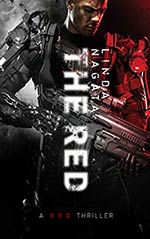
![]() jlafirira
jlafirira
10/2/2014
![]()
In Linda Nagata's "The Red: First Light" U.S. Military Lt. James Shelley finds himself being spoken to by God, warning him of otherwise unforeseeable events that could cost him and his Linked Combat Squad their lives. He becomes a "King David," of sorts. Craziness that transpires throughout the story leads him to question the validity of the voice in his head. Where is it coming from? Can it be trusted? Do others hear it too?
His squad functions in a near-future world torn apart by planned wars constructed by world defense contractors, a Cloud based network, and the greedy "dragons" that run everything behind the scenes. Nagata uses these corporate executive characters to warn of a future where greed and wealth control everything – politics, war, and nations. Overall, the story will keep a reader wrapped up for a few solid hours of immersive reading – but a reader might find themselves with unanswered questions, confusion and disappointment at the end. It's a clear setup for the sequel or second book in the series.
Throughout the story, many tough subjects are tackled. As mentioned earlier, corporate greed and commercial wars are a huge topic – the primary ones. However, Nagata attempts to cram in a lot more controversy and morals than the book really needs to tell the story. She hints at problems with addiction, problems in human relationships, and problems with the way that countries are run by their governments, but doesn't stop to answer or speak to any of these. These issues are just presented, and then left.
For instance, Lt. James Shelley has become an addict over the years, but not to a drug. He's addicted to emotional chemicals that keep his system stable. His military issued skullcap pumps chemistry into his brain to keep him from being depressed, and from thinking about anything too much. Whenever he takes it off, he speaks of a black void coming for him. This subject is never tackled or resolved, yet is repeatedly brought up. Could this also stem from Nagata's painful sequel planning?
The author also writes in a reality show that films the squad's lives without them knowing, through their own helmets. This ties in with the commercial war theme, but is almost unnecessary and feels forced. It's cliched, and doesn't really bring much to the table in terms of pushing the story forward.
Nagata then brings up an intricate, and interesting relationship between the Lt. and another character... who is then never seen again. Why start something you aren't going to complete, unless then again – it's scheduled for a future installment in the story. It's not fair to the reader to force them into purchasing something, just to tie up loose ends.
The issues that the novel does tackle, however, are pulled off quite well. There is a great deal of debate about the Cloud network, and how AI (artificial intelligence) will affect our futures, and how the human race and governments will handle it when things go awry. The reader is left wanting more when it comes to these subjects. They are executed with great detail and really help to keep the tale going and keep the reader interested.
Another thing that Nagata certainly does right is the world building. The world that 'First Light' is not far from our own. If things keep going the way they are today – she makes a chilling argument for what our nations might look like in the near future. The technology is believable, and achievable, while still being exciting and awe inspiring. She answers the questions many are asking. "If wars start becoming even more commodified, where will we end up?" "What kind of threat does a Cloud based network with integrated AI pose?" It could be a matter of time until this story simply becomes an alternate history, a scary thought.